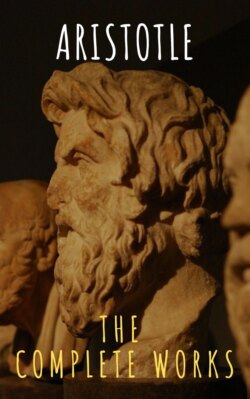Читать книгу Aristotle: The Complete Works - Aristotle - Страница 160
На сайте Литреса книга снята с продажи.
ОглавлениеTopics, Book I
Translated by W. A. Pickard-Cambridge
1
Our treatise proposes to find a line of inquiry whereby we shall be able to reason from opinions that are generally accepted about every problem propounded to us, and also shall ourselves, when standing up to an argument, avoid saying anything that will obstruct us. First, then, we must say what reasoning is, and what its varieties are, in order to grasp dialectical reasoning: for this is the object of our search in the treatise before us.
Now reasoning is an argument in which, certain things being laid down, something other than these necessarily comes about through them. (a) It is a ‘demonstration’, when the premisses from which the reasoning starts are true and primary, or are such that our knowledge of them has originally come through premisses which are primary and true: (b) reasoning, on the other hand, is ‘dialectical’, if it reasons from opinions that are generally accepted. Things are ‘true’ and ‘primary’ which are believed on the strength not of anything else but of themselves: for in regard to the first principles of science it is improper to ask any further for the why and wherefore of them; each of the first principles should command belief in and by itself. On the other hand, those opinions are ‘generally accepted’ which are accepted by every one or by the majority or by the philosophers-i.e. by all, or by the majority, or by the most notable and illustrious of them. Again (c), reasoning is ‘contentious’ if it starts from opinions that seem to be generally accepted, but are not really such, or again if it merely seems to reason from opinions that are or seem to be generally accepted. For not every opinion that seems to be generally accepted actually is generally accepted. For in none of the opinions which we call generally accepted is the illusion entirely on the surface, as happens in the case of the principles of contentious arguments; for the nature of the fallacy in these is obvious immediately, and as a rule even to persons with little power of comprehension. So then, of the contentious reasonings mentioned, the former really deserves to be called ‘reasoning’ as well, but the other should be called ‘contentious reasoning’, but not ‘reasoning’, since it appears to reason, but does not really do so. Further (d), besides all the reasonings we have mentioned there are the mis-reasonings that start from the premisses peculiar to the special sciences, as happens (for example) in the case of geometry and her sister sciences. For this form of reasoning appears to differ from the reasonings mentioned above; the man who draws a false figure reasons from things that are neither true and primary, nor yet generally accepted. For he does not fall within the definition; he does not assume opinions that are received either by every one or by the majority or by philosophers-that is to say, by all, or by most, or by the most illustrious of them-but he conducts his reasoning upon assumptions which, though appropriate to the science in question, are not true; for he effects his mis-reasoning either by describing the semicircles wrongly or by drawing certain lines in a way in which they could not be drawn.
The foregoing must stand for an outline survey of the species of reasoning. In general, in regard both to all that we have already discussed and to those which we shall discuss later, we may remark that that amount of distinction between them may serve, because it is not our purpose to give the exact definition of any of them; we merely want to describe them in outline; we consider it quite enough from the point of view of the line of inquiry before us to be able to recognize each of them in some sort of way.
2
Next in order after the foregoing, we must say for how many and for what purposes the treatise is useful. They are three-intellectual training, casual encounters, and the philosophical sciences. That it is useful as a training is obvious on the face of it. The possession of a plan of inquiry will enable us more easily to argue about the subject proposed. For purposes of casual encounters, it is useful because when we have counted up the opinions held by most people, we shall meet them on the ground not of other people’s convictions but of their own, while we shift the ground of any argument that they appear to us to state unsoundly. For the study of the philosophical sciences it is useful, because the ability to raise searching difficulties on both sides of a subject will make us detect more easily the truth and error about the several points that arise. It has a further use in relation to the ultimate bases of the principles used in the several sciences. For it is impossible to discuss them at all from the principles proper to the particular science in hand, seeing that the principles are the prius of everything else: it is through the opinions generally held on the particular points that these have to be discussed, and this task belongs properly, or most appropriately, to dialectic: for dialectic is a process of criticism wherein lies the path to the principles of all inquiries.
